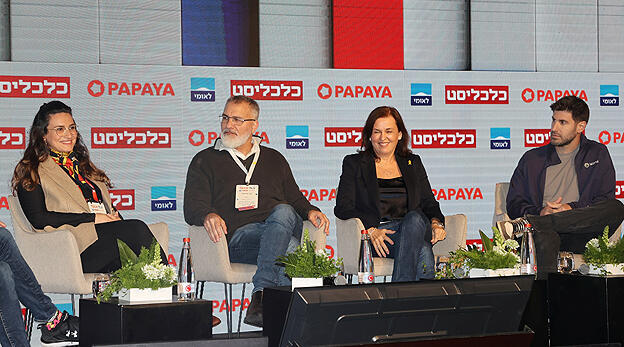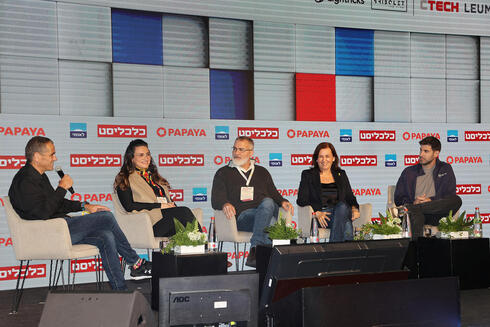
Tech TLV
"There will be fewer investments next year, but we believe in the Israeli economy"
Lisa Cohen, a partner at Intel Capital, Intel's venture capital fund, spoke as part of a panel on investments at Calcalist's Tech TLV conference. Regarding the consequences of the current war, Dan Amiga, co-founder and CTO at Island, said, "People have gone from asking what is my next project to worrying about existential security"
"The high-tech workers who were not drafted into the reserves felt the need to cover for their friends and prove to investors that we are here to stay, that we are resilient," said Sarit Firon, Managing Partner at Team8, at Calcalist's Tech TLV conference.
Firon, who was speaking as part of a panel on investments, capital raising and the future of Israeli high-tech moderated by Calcalist reporter Meir Orbach, added: "October 7 had a direct impact on us. There is an employee at one of the companies whose two sisters were kidnapped, and an employee at another company who lost first-degree relatives. The shock is absolutely enormous. 25% of the employees in the companies we invested in are recruited into the IDF reserves, in some of them the company founders are recruited. And for companies in the Seed and A round stages when the entrepreneurs are recruited, it is very significant. In one of the companies I became the acting CEO, and in the other where the two founders were recruited to the reserves, my partner stepped into their shoes."
Regarding the plight of investments in Israeli high-tech, Firon said that this is not the result of the war. "It was the judicial reform that alienated investors massively," she explained. "The war certainly didn't help, but they see it as a one-off event with an expiration date. During the judicial reform, they saw a country that was heading towards instability. This is very uncomfortable for foreign investors, so they stopped investing in Israel. This directly harms not only Israeli high-tech but also the economy and citizens. Our job was to restore trust. In board meetings with foreign investors when a siren went off and we said we'll be back in ten minutes, and then returned and talked as if nothing had happened, it resulted in admiration, affection and empathy. It helped in terms of how they saw us. We are a resilient economy with strong people."
Dan Amiga, co-founder and CTO at Island, spoke about how his company is dealing with the consequences of the war and the changes that followed: "You wake up to a new company. With us, over 30% of the employees were called to the reserves. People have gone from asking what's my next project or everyday issues to worries about existential security. You understand that as a company you become a home for employees. They come to you in the morning, you give them mental support. This is a change we had to make. To say we are here every day, supporting you with what you need. Because if people don't come to the office, they don't have a framework, they have no support.
"The average age at Island is low, under 30, and the second thing you understand is that you have to give them a future. We said that in Israel the equation is very simple: either you were called to the reserves, or you work for the economy. We went to the units of our employees in the army, we asked what they lacked, they told us what tactical equipment they lacked and we purchased and provided it to them. From a business point of view, the Americans worked very quickly switching from being concerned whether you can provide the product, to it's 'unbelievable what's going on here, and we will partner with you for many years'. The coming of age of this generation, the guys who serve in the army and are heroes in Gaza, or function in the economy in a way that is second to none, is a resilience that will resonate for many, many years in Israeli society."
Related articles:
Lisa Cohen, a partner at Intel Capital, Intel's venture capital fund, said the company is more committed than ever to investing in the local high-tech industry. "Intel Capital has been operating in Israel for 25 years, and they have not held a single discussion about the war with us. Last year we made five investments in Israel, four of which we closed after October 7. Intel believes in the Israeli economy and wants to seize the opportunities it offers. Regarding what is expected in the coming year, we think there will be fewer IPOs and more M&As, mainly from strategic investors and fewer financial investors. At the same time, we continue to operate almost as usual. 20% of the employees in the companies we invested in were called to the reserves, and they are slowly returning. There will be fewer investments next year. The rounds will be smaller, there will be fewer exits, but we are here to continue, we believe in the Israeli economy and we have good investments to make for many years to come."
Adv. Ofer Ben-Yehuda, partner and head of the high-tech department at Shibolet & Co. Law Firm, described the perceptions of foreign investors since October 7: "The judicial reform resulted in a loss of investor confidence. In the last three months I have personally seen 4 MOU deals that were signed, and at the moment they are not saying goodbye, but let's see where it goes. This is evident in companies that have real revenue. There was a deal where everything was closed, and at the last minute they added a condition that they want the company to produce inventory for a year and a half in advance. Some investors are disturbed by what is happening here. At the same time, the companies are required to be very creative, to show that they know how to work even under difficult circumstances."
